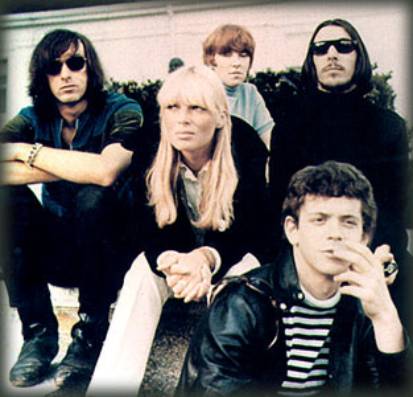Velvet Underground
Brian Eno has famously said that not many
people bought the Velvet’s albums when they were originally
released, but everyone who did formed a band. After bravely
jousting the twin enemies of indifference and open hostility
in its lifetime, the Velvet Underground has gradually been embraced
as one of the best and most important bands in rock history.
 Recording a mere
four studio albums and one live album in the late-'60s, the
group established an aesthetic so extreme, alien and ahead of
its time that it has taken three decades for the world to catch
up. The essence of that aesthetic is an unapologetic embrace
of the opposite poles of the musical, emotional and thematic
spectrum: naked power on the one end and exquisite beauty on
the other, squalid Saturday night nihilism followed by pristine
Sunday morning reverence conjured from the urban essence of
New York. Recording a mere
four studio albums and one live album in the late-'60s, the
group established an aesthetic so extreme, alien and ahead of
its time that it has taken three decades for the world to catch
up. The essence of that aesthetic is an unapologetic embrace
of the opposite poles of the musical, emotional and thematic
spectrum: naked power on the one end and exquisite beauty on
the other, squalid Saturday night nihilism followed by pristine
Sunday morning reverence conjured from the urban essence of
New York.
The Velvet Underground formed in 1964 when singer/guitarist/songwriter
Lou Reed and Welsh multi-instrumentalist John Cale met and decided
to form a rock band (eventually with Sterling Morrison on bass
and guitar and Maureen “Mo” Tucker on percussion),
drawing upon their mutual interest in R&B, the free-form jazz
of Albert Ayler and Ornette Coleman and the avant-garde minimalism
of John Cage and La Monte Young.
The band sought not just to entertain, but to challenge, to
prove that rock ‘n’ roll could be dangerous again.
They gravitated toward Andy Warhol — who brought Austrian
actress/model/chanteuse Nico into the fold — and became
fixtures in Warhol’s multimedia organization, the Factory,
and in the Village bohemian art scene.
Live, the Velvets were a bizarre amalgam of vigorous R&B, pretty
pop songs, extended experimental noise jams and the performance
art of Warhol’s Exploding Plastic Inevitable. The original
band lasted just two albums, “The Velvet Underground and
Nico,” and “White Light, White Heat” (both
1967), the first of which stands among the greatest of all rock
albums.
“Waiting for the Man,” with a breezy rock groove,
follows a Reed character in pursuit of drugs. Reed is almost
giddy with self-contempt as his need for drugs drags his social
status below that of ghetto dwellers, and that defiant self-contempt
defines the Velvet’s status as the first post-modern band
and the progenitor of the entire punk/new wave movement.
“Heroin” takes the external adventure of obtaining
drugs into the internal realm and captures the seduction of
addiction with a power, beauty and grace that makes it all the
more frightening. “Venus in Furs,” an unblinking
examination of an S&M relationship, conveys ennui of almost
black hole density. “All Tomorrow’’s Parties”
is Nico’s finest moment, a towering aural monument to
ephemeral glamour, with the pulse of dread and Reed’s
destabilizing frantic guitar.
Also on the record are two more pretty, Reed penned/Nico sung
jewels, “I’ll Be Your Mirror” and “Femme
Fatale,” and the loveliest song of Reed’s career,
the preternatural “Sunday Morning,” which captures
the hope and regret of a dawning Sunday with awe and delicacy.
The group’s remaining three albums produced several more
gems in “White Light, White Heat,” “What Goes
On,” “Beginning to See the Light,” “Pale
Blue Eyes,” “Sweet Jane,” and “Rock
and Roll,” all of which and more can be found in the highly
recommended box set “Peel Slowly and See.”
|